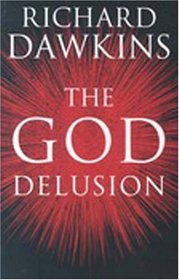Helpful Score: 13
This is a great book. Dawkins demolishes just about every argument for religion there is. Others have suggested that a couple of chapters get muddled, but I thought they were all well written. Highly recommended.
Helpful Score: 5
Some great points are made, and then made again, and again. But he makes clear points on our origins and validates all people who do not believe in the supernatural. And in America, I think we need some validation.
Helpful Score: 4
An excellent introduction to the idea that God is really not likely, or even necessary. A lot of ideas that skeptics have entertained but not developed will be crystallized by the author's excellent elucidations. Reading this book will give you lots of talking points to help you defend your position when confronted with zealots. It also helps one understand the real dangers to society of allowing even moderate religiosity to persist unchallenged.
The one topic I would have liked to see covered which was not was the idea that individual brain chemistry has a lot to do with our propensity for unsupported faith. A tidbit from Temple Grandin's Thinking in Pictures comes to mind, where she fell into a vat of chemicals (used for delousing cows, or some such) and afterward had a completely different perspective on religion. I don't know how much research has been done on neurotransmitter-based religiosity but I would have liked to have seen it mentioned by Dawkins.
Overall, and excellent book. Gives one the confidence to profess one's doubts and disbelief.
The one topic I would have liked to see covered which was not was the idea that individual brain chemistry has a lot to do with our propensity for unsupported faith. A tidbit from Temple Grandin's Thinking in Pictures comes to mind, where she fell into a vat of chemicals (used for delousing cows, or some such) and afterward had a completely different perspective on religion. I don't know how much research has been done on neurotransmitter-based religiosity but I would have liked to have seen it mentioned by Dawkins.
Overall, and excellent book. Gives one the confidence to profess one's doubts and disbelief.
Helpful Score: 1
This book and "God is Not Great: How Religion Poisons Everything" by the late great Christopher Hitchens are the gospels of atheism.
Nobody else has made the case better for the toxic effects of belief in imaginary beings. I'd say Hitchens is better at highlighting the evil outcomes of belief in imaginary beings, while Dawkins does the better job of highlighting the logical, scientific and philosophical absurdity of belief in imaginary beings.
Read them both.
Nobody else has made the case better for the toxic effects of belief in imaginary beings. I'd say Hitchens is better at highlighting the evil outcomes of belief in imaginary beings, while Dawkins does the better job of highlighting the logical, scientific and philosophical absurdity of belief in imaginary beings.
Read them both.
Helpful Score: 1
delusion [n.] a persistent false belief held in the face of strong contradictory evidence
Robert M. Pirsig, 'When one person suffers from a delusion, it is called insanity. When many people suffer from a delusion it is called Religion.'
Although some of Dawkins arguments are only speculation (though very plausible) and his weakest pieces of evidence (ie: the theory that religion may be an evolutionary by- product of a psychological disposition once important to our survival), he makes very clear and valid points using science and logic (most of which are Darwin- inspired, ie: 'A designer God cannot be used to explain organized complexity because any God capable of designing anything would have to be complex enough to demand the same kind of explanation in his own right.')
I don't believe this book will succeed in converting even the moderately religious because of the offense Dawkins' judgmental and superior air incites (however, the fact that he can be an ass does not negate his poignantly crafted assertion of his 'God Hypothesis'), I recommend this book to anyone interested in seeing religion from a different point of view. And if you're the adventurous type, it may even test your faith
Robert M. Pirsig, 'When one person suffers from a delusion, it is called insanity. When many people suffer from a delusion it is called Religion.'
Although some of Dawkins arguments are only speculation (though very plausible) and his weakest pieces of evidence (ie: the theory that religion may be an evolutionary by- product of a psychological disposition once important to our survival), he makes very clear and valid points using science and logic (most of which are Darwin- inspired, ie: 'A designer God cannot be used to explain organized complexity because any God capable of designing anything would have to be complex enough to demand the same kind of explanation in his own right.')
I don't believe this book will succeed in converting even the moderately religious because of the offense Dawkins' judgmental and superior air incites (however, the fact that he can be an ass does not negate his poignantly crafted assertion of his 'God Hypothesis'), I recommend this book to anyone interested in seeing religion from a different point of view. And if you're the adventurous type, it may even test your faith




